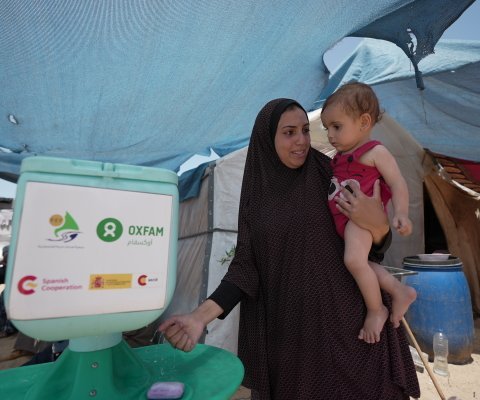Weather-related disasters have quadrupled over the last two decades, from an average of 120 a year in the early 1980s to as many as 500 today, according to international agency Oxfam America in a new report. The increase in these extreme climatic events is in line with climate models developed by the international scientific community.
>
>The number of people affected by disasters has risen by 68 percent, from an average of 174 million a year between 1985 to 1994, to 254 million a year between 1995 to 2004, according to Oxfam. Earlier this year the Asian floods alone affected 248 million people. There has been a six-fold increase in floods since 1980. The number of floods and windstorms have risen from 60 in 1980 to 240 last year. Meanwhile the number of geothermal events, such as earthquakes and volcanic eruptions, has stayed relatively static.
>
>"In 2007, we have seen floods in South Asia, Africa, and Mexico that have affected more than 250 million people. But this is no freak year, it follows a pattern of more frequent, more erratic, more unpredictable and more extreme weather events that are affecting more people,” said Raymond C. Offenheiser, president of Oxfam America. “What we need now is action to prepare for more disasters or humanitarian assistance will be overwhelmed and recent advances in human development will go into reverse."
>
>Though colossal crises such as the African famines of the early 1980s, the Bangladesh cyclone of 1991 and the Asian tsunami cause enormous loss of life, the new worrying trend is the increase in small to medium-sized disasters. The death toll caused by these disasters has risen from an average of 6,000 in 1980 to 14,000 in 2005.
>
>“One short disaster after another, even if relatively small, can push poor people and communities into a downward spiral from which is very difficult to recover,” said Offenheiser. “To make matters worse, donor countries tend to prioritize their aid spending into the more high-profile emergencies and to those countries that are seen as being in line with their foreign policy priorities.”
>
>Some countries are particularly prone to weather-related disasters, according to the agency. In August 2007 Vietnam suffered a severe storm and flooding that devastated the country's central provinces and then in October Typhoon Lekima caused landslides and widespread flooding on a scale not seen in 20 years. Vietnam is also likely to be hardest hit of all by rising sea levels according to World Bank research. Meanwhile drought there is also becoming more common. New Oxfam research in Ninh Thuan province shows how, during droughts, women suffer most, having to walk long distances to fetch water in extreme temperatures.
>
>Oxfam called on donor country governments and the UN to make humanitarian aid faster, fairer and more flexible and to improve ways to prepare for and reduce the risk of disasters. As rising greenhouse gas emissions are the major cause of weather-related disasters, Oxfam also called on governments meeting in Bali for the UN conference on Climate Change next month to agree on a mandate to negotiate a global deal that will provide assistance to developing countries to cope with the impacts of climate change and reduce greenhouse gas emissions, with historical polluters moving first and fastest since they are most responsible for climate change.
>
>“For poor people who are dependent upon the land, even a slight change in the climate can have a long-term impact on their livelihoods,” said Offenheiser. “As one of the world’s largest greenhouse gas emitters, the United States has a responsibility to address these increasingly severe impacts – both by leading the effort to reduce global warming emissions through mandatory international targets and by increasing assistance to the most vulnerable communities to adapt to climate impacts.”
>
>
There was a response error processing your form. Please try again. Error code: GLB
Thank you
We’ll provide you with information and tools you need to take on the injustice of poverty.


